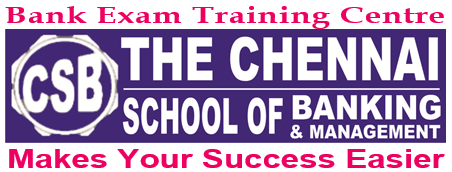Chennai School of Banking (CSB), the Leading Training Institute in Chennai, trains candidates for the RBI GRADE B OFFICER examination, according to the latest pattern and with previous year question papers. Join CSB and face the Phase I and Phase II exams and the following interview with confidence.
Posts | Educational Qualifications |
Officers in Grade ‘B’ (DR) – (General) | Applicants must possess 60% of marks 10th standard, 12th standard as well as in bachelors’ degree from a state or Central Board/ University respectively (50% for SC/ ST/ PWD) |
Officers in Grade ‘B’ (DR) – DEPR | Applicants must have a Masters Degree in Economics/ Finance/ Mathematical Economics/ Econometrics/ Integrated Economics Course/ Quantitative Economics with at least 55% of marks. (50% for SC/ ST/ PWD) |
Officers in Grade ‘B’ (DR) – DSIM | · Applicants must have a master’s degree in Mathematics/ Economics/ Mathematical Statistics/ Econometrics/ Statistical and Informatics from IIT Kharagpur with at least 55% in all years, or · Master’s Degree in Mathematics/ PG Diploma in Statistics from reputed an Institute, or M. Statistics from ISI with 55% mark in all semesters, or · PG Diploma in Business Analytics from ISI Kolkata, IIT Kharagpur, IIM Calcutta with 55% of marks. (5% relaxation for SC/ ST/ PWD) |
– Phase I
– Phase II
– Interview process
Sections | Questions | Marks | Duration |
General Awareness | 80 | 80 | 120 Minutes, section-wise timing |
Quantitative Aptitude | 30 | 30 | |
English Language | 30 | 30 | |
Reasoning | 60 | 60 | |
Total | 200 | 200 |
Officer in DR (Department of Economic & Policy Research) General
Section | Marks | Duration |
Economics and Social Issues (Objective Type) | 100 | 90 minutes |
Finance and Management (Objective Type) | 100 | 90 minutes |
English (Writing Skills) – (Descriptive) | 100 | 90 minutes |
Subject | Syllabus |
Economic & Social Issues | Growth and Development, Economic Reforms in India, |
Finance | Financial System, Financial Markets, Risk Management |
Management | Role of Manager, Human Resource Development, |
RBI Grade B Mains syllabus for all papers is provided below in the table:
This paper is conducted to assess the writing skill of the candidate that’s why it contains only 3 questions.
The interview is the 3rd phase of the RBI Grade B Recruitment Process 2023. Phase 3 includes a Psychometric Test which will be followed by an Interview. Before the interview, there will be a test namely, Psychometric Test. Every candidate of RBI Grade B Recruitment has to undergo the test first. There will be no marks given for the Psychometric Test. After the Psychometric Test, the interview carries 75 marks and the candidates can choose the language of the interview.
Check out the Chennai School of Banking to start a brilliant career with RBI.
